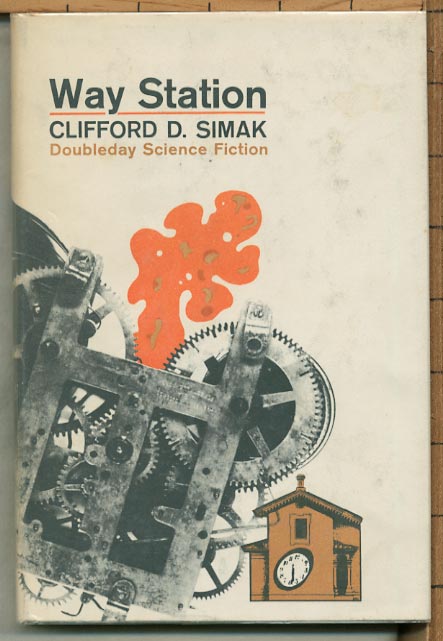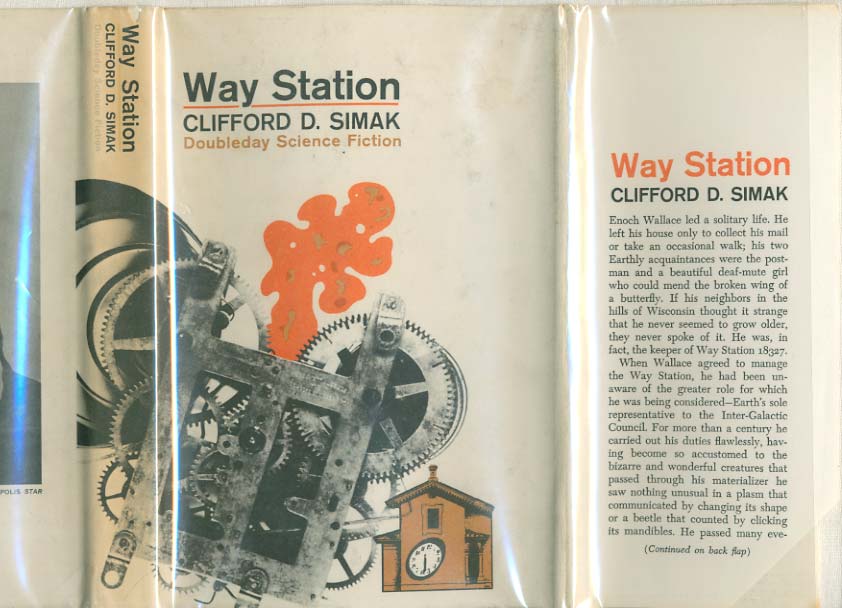
author:
title:
Simak, Clifford D.
WAY STATION
book-date: 1963
edn-date:
printing:
format:
cvr art:
cvr price:
GRADING:
1963
Hardcover
Ronald Fratell
Book= near-Fine
Dustjacket= near-Fine
Way Station - a great novel by Clifford D. Simak. This won the Hugo Award in 1964 under its magazine title. A streamlined version was serialized in Galaxy (as "Here Gather the Stars") - June & August 1963. This is one of my favorite books, and makes my "top-10" list. For a decent plot summary, I'm quoting from a review from Analog (April 1964), then following that up with the jacket copy from the original hardcover which gives a good set-up, and then I have a few comments of my own after that.
"If you can't stand what Kingsley Amis called Clifford Simak's "pastoral" approach to SF, then this new novel isn't for you. If - like me - you enjoy it, you are likely to find Way Station one of the best books of 1963, and far ahead of They Walked Like Men. Enoch Wallace, returning to the family farm in the Wisconsin back country shortly after Gettysburg, encountered a wandering stranger - an extremely strange stranger - who offered him an equally strange job. The venerable farmhouse where two or three generations of Wallaces had been born and lived was converted into a relay station for an intergalactic matter transmitter, and Enoch became its custodian. Through the decades the utterly strange peoples of utterly strange worlds passed through the Earth station, leaving memories, gifts, friendships with the lonely man who received and made them comfortable, and passed them on. Then in our times curiosity tipped the balance a little too far, and the CIA became interested in the farmhouse on the bluffs above the fledgling Mississippi. At the same time a crisis arose in the Inter-Galactic Council - a politics-as-usual situation that wryly suggests the kinship of social beings everywhere - and a third in Enoch's relations with his neighbors. I think it's the best book Clifford Simak has written since City, but I'm a country boy myself and easily wondered. I still say you'll be sorry if you pass it up." [-P. Schuyler Miller]
[...the flap-copy from the 1963 hardcover...]: Enoch Wallace led a solitary life. He left his home only to collect his mail or take an occasional walk; his two Earthly acquaintances were the postman and a beautiful deaf-mute girl who could mend the broken wing of a butterfly. If his neighbors in the hills of Wisconsin thought it strange that he never seemed to grow older, they never spoke of it. He was, in fact, the keeper of Way Station 18327. When Wallace agreed to manage the Way Station, he had been unaware of the greater role for which he was being considered - Earth's sole representative to the Inter-Galactic Council. For more than a century he carried out his duties flawlessly, having become so accustomed to the bizarre and wonderful creatures that passed through his materializer he saw nothing unusual in a plasm that communicated by changing its shape or a beetle that counted by clicking its mandibles. He passed many evenings listening to the fascinating tales of these travelers from the furthest reaches of space. Then the outside world threatened to destroy the Way Station, and with it, man's last hope of avoiding cataclysmic self-annihilation. The CIA suddenly became interested in a Civil War veteran who looked younger than thirty, an alien corpse in his family cemetary, and a house whose windows could not be broken with an axe.
This is one of those books that I'll be happy to sell as many nice copies that I can find. I think it is Simak's best book, but I would not recommend it to be the first Simak book you read - you might later form the opinion that his other books "aren't as good as this one." I think Simak is a good-to-great writer who wrote an extraordinay book that will always remain one of the best in the field. If you haven't read any Simak, try one of his collections first, or City or Time and Again or Time is the Simplest Thing. This is a thoughtful novel that is full of Simak's "pastoralism" - a combination of rural neighborlyness and wonder at new or alien things. Simak is addressing the most important problems the world at the time faced, in his unique fashion. I really like the way the book sneaks up on you: approaching Wallace from the viewpoint of his observers, then showing us that Wallace is quite aware that he is being observed, since he has been observing the world and keeping up on its affairs through the periodicals he subscirbes to. He sees the brink towards which the world is heading, and looks for ways to apply alien philosophies or mathematics towards a solution.
A note about the magazine serial: the version in Galaxy is "stripped-down" or plot-only. The book has much more richness of language and detail - an elegance or poetic quality absent from the serial. The closest thing I can compare it to is the difference between Arthur C. Clarke's Against the Fall of Night from 1948 and his revision/expansion of that in 1956 to The City and the Stars.
